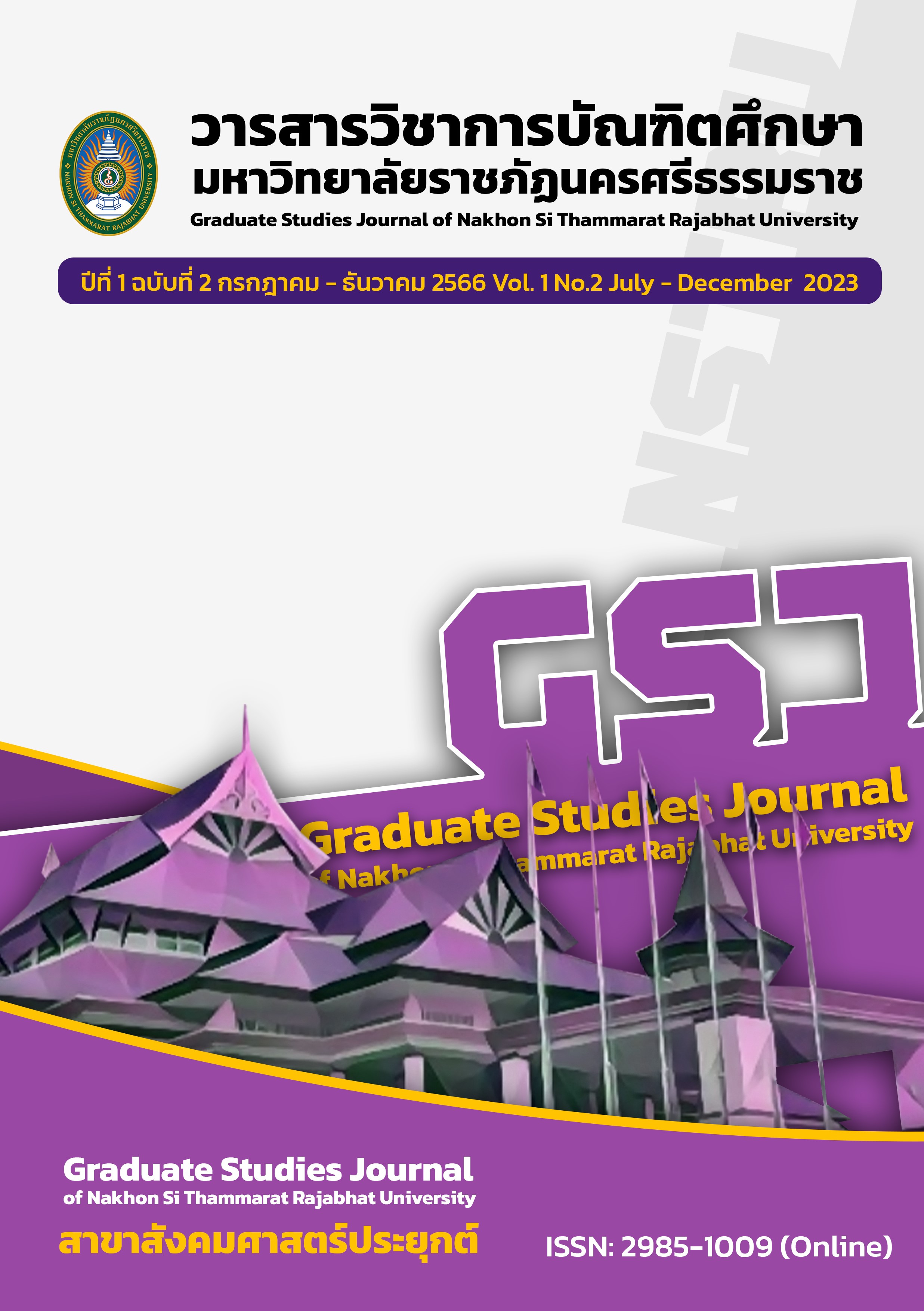GUIDELINES TO MANAGING THE STUDENT AFFAIR IN THE EDUCATIONAL OPPORTUNITY EXTENSION SCHOOLS UNDER THE OFFICE OF KANCHANABURI PRIMARY EDUCATIONAL SERVICE AREA 3
GUIDELINES TO MANAGING THE STUDENT AFFAIR IN THE EDUCATIONAL OPPORTUNITY EXTENSION SCHOOLS UNDER THE OFFICE OF KANCHANABURI PRIMARY EDUCATIONAL SERVICE AREA 3
Abstract
This research aimed to 1) study the student affairs administration in educational 2) opportunity expansion schools under Kanchanaburi Primary School Education Service Area Office 3.
The sample of this research consisted of 294 administrators and teachers in educational opportunity expansion schools under Kanchanaburi Primary Educational Service Area Office 3, obtained by stratified random sampling according to educational areas. The research instrument were a five-level rating scale questionnaire with content validity between 0.67-1.00 (31 items for 0.67 and 1 item for 1.00) and reliability of 0.93. The statistics used in the data analysis were percentage, mean, standard deviation and content analysis.
The findings were as follows:1) The student affairs administration in educational opportunity expansion schools under Kanchanaburi Primary School Education Service Area Office 3, overall and each individual aspect, was at a high level ranking in descending order as the implementation of student care and support system, promotion and development in students’ discipline, morality, and ethics, student affairs evaluation, student affairs administration, democracy promotion in school and student affairs planning. 2) The guidelines for student affairs administration in educational opportunity expansion schools under Kanchanaburi Primary Educational Service Area Office 3 were as follows: Schools should promote producing student affairs manual which is relevant to strategy and policy of Ministry of Education and changing situation in current society. This could be practical guidelines for teachers and students. Training for teachers and personnel in student affairs should be promoted. In the aspect of student affairs administration, schools should survey learners’ need for activities in each semester. Students can learn according to their aptitude and interest. There should be statistic form to record student’s well-doing and disciplinary offense as information which is easy to care and examine in each semester or annually. Self-awareness on discipline, morality, and ethics simultaneously teaching and giving advice with students care system covering five steps concretely should be built among teachers. Knowledge sharing should be done between former teachers and present teachers to propose useful information or techniques to student care and support system. School democracy should be promoted both inside and outside school. All activities should be evaluated to improve and develop further activity. Annual report of conducting activities should be publicized to parents, communities and organizations
References
Aranyakanon, B. and Petpon, P. (2018). A study of the current state, desired state and need analysis for student affairs management of Traill International School based on the concept of student engagement. Master thesis, M. Ed., Chulalongkorn University, Bangkok.
Atidtung, K., Supruangthong, S. and Suntawan, T. (2022). Guidelines for the administration of student affairs in educational institutions under Nakhon Sawan Secondary Education Service Area Office. Education Journal, Faculty of Education, Nakhon Sawan Rajabhat University, 5(2), 100-112.
Kamchiengkam, A., (2018). The development of effective student affairs management at SonthirajWittaya School under the Office of Secondary Educational Service Area 22. Master thesis, M.Ed., Sakhon Nakorn Rajabhat University, Sakhon Nakorn.
Krejcie, R. V., & Morgan, D. W. (1970). Determining sample size for research activities. Educational and Psychological Measurement, 30(3), 607-610.
Ministry of Education. (2009). Student support system, principles, concepts, and directions in action. Bangkok: Bureau of Academic Affairs and Educational Standards.
Ministry of Education. (2011). Guidelines for measurement and evaluation of students’ desired characteristics in accord with the basic education core curriculum B.E. 2551. Bangkok: The Agricultural Co-Operative Federation of Thailand Press.
Office of the Education Council. (2017). National Education Plan B.E. 2560-2579. Bangkok: Prikwan Graffic.
Office of Basic Education Commission. (2017). Standards of mattayomsuksa school operation B.E. 2552 (Rev. B.E. 2560). Bangkok
Office of Mental Health Development. (2021). Manual of student support instructors level 3-4 (Mattayom 1-6). Bangkok: the War Veterans Organization of Thailand Press.
Photichan, P. (2021). Student affairs administrations in schools under Kanchanaburi Primary Educational Service Area Office 3. Master independent study, M. Ed., Kanchanaburi Rajabhat University, Kanchanaburi.
Phochuen, P., Suwanwong, A. and Pinyo, T. (2017). A guidelines for teacher’s student affairs administration of secondary schools in the Secondary Educational Service Area Office 8 Ratchaburi Province. Journal of Yannasangvorn Research Institute Mahamakut Buddhist University. 10 (1), 152-162.
Puangto, R., Srivichai, S. and Ruangsanka, R. (2019). The student affairs administration of schools under the Secondary Educational Service Area Office 3, Phra Nakhon Si Ayuttaya Province. Master thesis, M. Ed., Mahachulalongkornrajavidyalaya University, Phra Nakhon Si Ayutthaya.
Ruengwanit, A. and Noichan, N. (2020). The presentation of guidelines for student affairs service management of Nontaburi Pittayakom School under the Secondary Educational Service Area Office 3. Journal of Graduate Studies in Northern Rajabhat Universities, 4(7), 101-116.
Sangprasert, W. (2020). Guidelines for student affairs administration of the educational opportunity expansion schools under the Samutsakhon Primary Educational Service Area Office. Valaya Alongkorn Review (Humanities and Social Science), 10(3), 112-125.
Sangsutthi, T. and Waroonroj, J. (2022). Student affairs administration guidelines in small schools under Khon Kaen Primary Educational Service Area Office 5. Journal of Buddhist Education and Research: JBER, 8(1), 152-167.
Songsri, O., Prawatrungroung, P. and Prajanband, P. (2014). A model for participatory administration of student affairs in the secondary school under the Secondary Education Service Area. Chandrakasem Rajabhat University Journal, 20(30), 144-151.
Theerachaovapat, T. and Charoenkul, N. (2017). Guidelines for management of student affairs of schools under the St. Gabriel’s Foundation of Thailand. Master thesis, M. Ed., Chulalongkorn University, Bangkok.
Uanomijtkul, W. and Suksodkiew, W. (2014). Student affairs management of Ngiuraiboonmeerangsarit School. Master independent study, M.Ed., Silpakorn University, Nakhon Prathom.
Wanpon, N. and Sauphayana, S. (2021). The study of problem state in student affairs administration in educational opportunity expansion schools under Phetchaburi Primary Educational Service Area Office 2. Journal of Roi Kaensarn Academi, 6(1), 113-127.
Downloads
Published
How to Cite
Issue
Section
License
Copyright (c) 2023 Graduate Studies Nakhon Si Thammarat Rajabhat Univeristy

This work is licensed under a Creative Commons Attribution-NonCommercial-NoDerivatives 4.0 International License.






